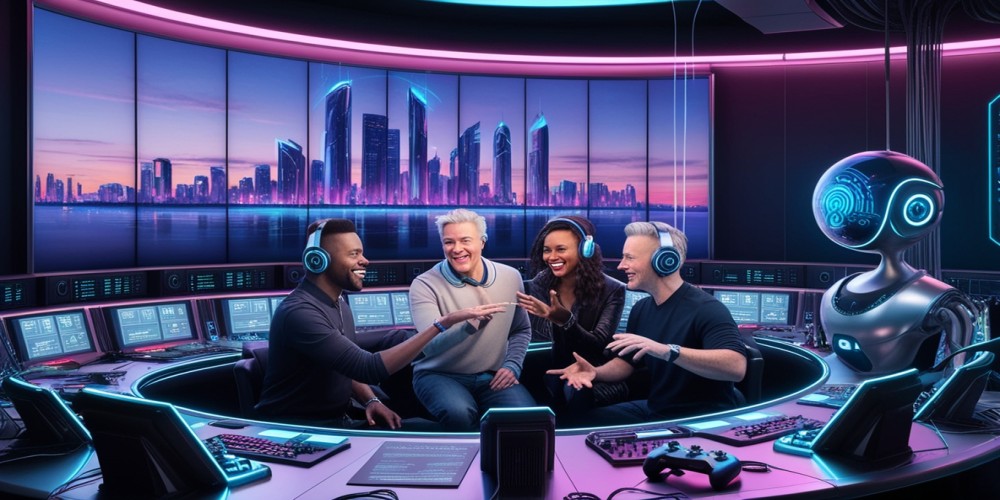Navigating the Future: Voice Actors, AI, and the Evolving Landscape of the Gaming Industry
- 23/09/2024

The ongoing discussions surrounding the rights of video game voice actors have reached a significant milestone as the situation develops. Recently, substantial strides have been made in the negotiations between voice actors and game developers, focusing particularly on the implications of artificial intelligence in the gaming industry. The Screen Actors Guild — American Federation of Television and Radio Artists (SAG-AFTRA) has been instrumental in advocating for the rights of its members, and recent agreements are a testament to the evolving landscape of voice acting in video games. In this article, we will investigate the most recent updates regarding the voice actor strike, the agreements signed, and the broader implications for the gaming industry.
Background of the Strike

The voice actor strike originally commenced on July 26, 2024, primarily to improve working conditions and address critical concerns related to the use of artificial intelligence in the industry. With increasing reliance on AI technologies, voice actors felt the need to safeguard their positions against potential exploitation.
Lightspeed LA Takes a Stand
In a pivotal development, Lightspeed LA, the developer behind the anticipated game Last Sentinel, has signed the SAG-AFTRA Interim Interactive Media Agreement. This move signifies a commitment to providing fair working conditions and acknowledging the invaluable contributions of voice actors.
SAG-AFTRA’s Commitment
The agreement established by SAG-AFTRA ensures that companies can engage with union members while adhering to equitable practices. By signing this agreement, Lightspeed LA affirms its dedication not only to quality in game development but also to fostering a respectful environment for all actors involved.
Widespread Support
Since the initial signing, an impressive number of 80 games have joined in compliance with SAG-AFTRA's A.I. terms. This rapid endorsement illustrates the industry's collective shift toward responsible practices regarding talent rights.
AI as a Central Topic
AI remains a central focus of the negotiations. The SAG-AFTRA statement emphasizes that the agreement permits members to engage in work during the ongoing strike while rooting for essential protections against AI misuse.
Insights from Industry Leaders

Steve Martin, the operations director at Lightspeed LA, openly expressed his belief in the irreplaceable role of voice talent. He highlighted that the creative energy and innovation brought forth by these actors are what elevate the storytelling in video games.
Voices of Concern
Jennifer Hale, an acclaimed voice actress from franchises such as Mass Effect, has voiced her concerns regarding the impact of AI on individual artistry. Her metaphorical comparison of AI to a hammer underscores the dual potential of technology, both constructive and destructive.
Financial Disparities
Hale's experience with contracts spotlighted a recurring issue in the industry. She revealed her modest compensation of $1,200 for her role in Metal Gear Solid, a title that netted Konami hundreds of millions in revenue, underscoring the financial struggles many voice actors face.
Community Voices Against AI
Fellow voice actor Doug Cockle has echoed similar sentiments, advocating for caution concerning AI's evolving role within game development. His perspective denotes a crucial awareness regarding the balance between innovation and preservation of human talent.
A New Direction with Morpheme.ai
In response to these challenges, voice actor Cissy Jones has initiated Morpheme.ai, a company designed to empower voice actors through AI. This venture aims to provide performers with tools to manage their vocal likenesses and take charge of their representation in a tech-centric marketplace.
Digital Misuse Highlighted
Concerns around AI extend beyond negotiations, reaching into creative integrity. Instances of AI-generated explicit mods in games like Skyrim have raised alarms among voice actors, signaling the potential for reputational harm.
Community Backlash Against AI Tools

Victoria Atkin, known for her role in Assassin’s Creed Syndicate, has aptly termed the use of AI-generated tools as the “invisible enemy.” This emotional response encapsulates the fear that many actors share regarding the unauthorized use of their work.
Continuing Advocacy
Paul Eiding, who lends his voice to Colonel Campbell, a character in the Metal Gear Solid franchise, has also taken a stand against the exploitation of AI in coding voices. His advocacy illustrates a growing realization among voice talent regarding the implications of technology on their craft.
Miscommunication and Updates
The conversation surrounding these agreements has seen its share of challenges. Early reports mistakenly indicated that Lightspeed LA was the sole signatory. Subsequent updates clarified that other studios are also on board, showcasing a more comprehensive industry response.
The Future of Voice Acting
As the gaming industry keeps advancing and changing with technological advancements, the role of voice actors will likely adapt to new norms. The balance between human artistry and AI capabilities remains a delicate subject, warranting ongoing conversation within industry circles.
Broader Industry Impacts

The outcomes of these agreements reflect a critical turning point in the voice acting sector. Stakeholders are now more cognizant of the repercussions of AI, striving for a framework that protects individual rights while embracing innovation.
Conclusion: A Collective Journey Ahead
The shared journey towards establishing a just and equitable work environment for voice actors is indeed a collective effort. As the negotiations advance and more game developers recognize the importance of talent protection, the future of the voice acting industry stands poised for positive transformation. As actors and their advocates continue to engage in dialogue, the balance between technology and creativity can lead to a more transparent industry that values the indispensable contributions of voice actors.
Latest Articles
-
![Whispered Treasures: The Enchanting Quest for Chijiko in Nioh 3]() Whispered Treasures: The Enchanting Quest for Chijiko in Nioh 3
Nioh 3 immerses players Within a realm where each nook conceals a hidden mystery, … playful secret waiting to be revealed. Among these secrets are the elusive handbell collectibles known as Chijiko. Their presence adds both charm and tangi...
Whispered Treasures: The Enchanting Quest for Chijiko in Nioh 3
Nioh 3 immerses players Within a realm where each nook conceals a hidden mystery, … playful secret waiting to be revealed. Among these secrets are the elusive handbell collectibles known as Chijiko. Their presence adds both charm and tangi... - Editor's Choice
- Frederick Clark
- 06/02/2026
-
![Exciting New Era: Streaming Service Unveils 2026 Slate Featuring Jonah Hill’s Outcome]() Exciting New Era: Streaming Service Unveils 2026 Slate Featuring Jonah Hill’s Outcome This recent announcement by a popular streaming service signals an exciting chapter ahead in 2026, setting the stage for breakthroughs in content and providing a glimpse into the impressive slate planned for the next 11 months.
At a high-p...
Exciting New Era: Streaming Service Unveils 2026 Slate Featuring Jonah Hill’s Outcome This recent announcement by a popular streaming service signals an exciting chapter ahead in 2026, setting the stage for breakthroughs in content and providing a glimpse into the impressive slate planned for the next 11 months.
At a high-p... - News
- Eleanor Wilson
- 06/02/2026
-
![Capcom Unveils Anniversary Hub and New Installment for 20-Year Legacy]() Capcom Unveils Anniversary Hub and New Installment for 20-Year Legacy Capcom has unveiled a dedicated online platform to mark the twenty-year milestone of a cherished game. Among several celebrated moments in gaming this year, the notable title commemorates its anniversary in April with a special website desi...
Capcom Unveils Anniversary Hub and New Installment for 20-Year Legacy Capcom has unveiled a dedicated online platform to mark the twenty-year milestone of a cherished game. Among several celebrated moments in gaming this year, the notable title commemorates its anniversary in April with a special website desi... - News
- Frederick Clark
- 06/02/2026






